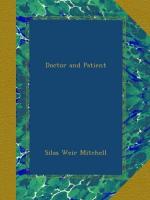There is another matter of moment as to cases known to be hastening to a fatal conclusion. The responsibility of withholding this knowledge from the patient is usually shifted on to the shoulders of relatives or friends. The medical adviser reports to them his opinion and leaves with them the power to act.
He is often asked if to know that death seems certain makes less the chance of recovery or shortens the lessening number of the days of life yet left. It has often fallen to my sad lot, as to that of many of my medical brothers, to have to tell a patient that he is to die. Some isolated man asks it. Some lonely hospital patient has just reasons for knowing early or late in his disease the truth as the doctor sees it. I have never been able to feel certain that in any case of acute or hopeless illness to know surely what lay before a sick man did distinctly shorten his life. I have seen many people in apparent health made ill by the shock of emotion,—by fear, grief, anger, jealousy. Diseased persons feel less, or show less in a physical way, the results we might expect to see from even the most rudely conveyed intelligence as to their probable future.
It was not my wish to enter into a long discussion of all the qualities which go to make up the ideal physician. I desired chiefly to consider his principal needs, to point out in big defence certain of his embarrassments, and to leave the reader with some sense of help towards knowing whether his adviser was such as he should be in the more important qualities which go to make the true physician. There are other and minor matters which are not without their relative gravity in his life. Some are desirable but not truly essential, and yet help or hurt him much. Whether he is gentle and well-mannered, is socially agreeable, or as to this negative, influences much the choice of the woman on whom, as a rule, comes finally the decision of who her family physician shall be. Too often she is caught by the outside show of manners, and sets aside an abler and plainer man, who has more really the true manners of the heart, yet lacks the power to make himself pleasant. Desirable it is, of course, to be what so many of the best physicians have been, refined and tactful gentlemen, and also charming companions. But a man may be a most competent, clear-headed, honest, scrupulously careful doctor, and yet be plain, ill-dressed, and uninteresting, and all this it is as well to understand. The mass of professional opinion is not so easily pleased as are individual patients. It decides pretty early in any large community, and classifies its members accurately, reversing very often the verdict of the juries of matrons, who do so much to make or mar our early fates. Soon or late it sifts the mass, knows who are the thorough, trustworthy, competent, hard-headed practitioners, who are the timid, who the too daring, who ride hobbies, and who trust too much to drugs. Soon, too, it distinguishes those on whom it can call in emergencies, and the highest class of men who have the great gift of discovery and the genius of observation.




